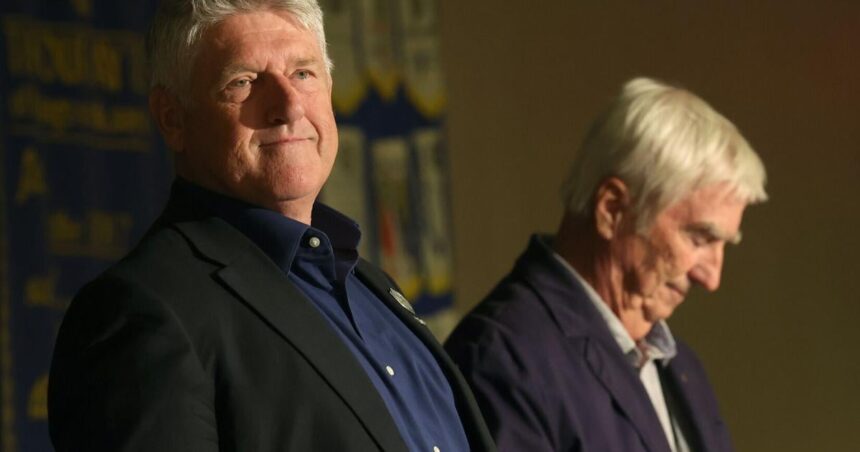Democrat John Driscoll opened a recent Billings forum between himself and Troy Downing, his Republican opponent in the eastern congressional district race, with an unconventional move.
“I’m glad I finally had a chance to meet Commissioner Downing and to congratulate him. I think he’s going to do very well in this election,” Driscoll told a room full of Rotarians gathered for lunch at the Northern Hotel here. “Eastern Montana is for Republicans what Butte has always been for Democrats, so I kind of know what to expect.”
Downing, the state auditor, emerged from a nine-way GOP primary this June with 36% of the vote, a decisive victory that essentially secured him a seat in the U.S. House. That premise carried the exchange between the two candidates, as Downing spoke to the Rotarians more about what he wants to accomplish in Congress than spending time contrasting himself with Driscoll. The Democrat shared the ideas that are important to him, while acknowledging he very likely won’t be governing to implement them.
People are also reading…
Driscoll holds no false aspirations about his chances in this district— it’s as red as the region’s clinker-capped hills. The Cook Partisan Voting Index ranks it a R+16. Last cycle, the first for the newly drawn region carved out of the state’s previous at-large seat, an independent candidate pulled in 3,715 more votes than the Democrat and even their support combined came up 14.5 percentage points shy of the Republican who won.
That man, U.S. Rep. Matt Rosendale, bowed out of seeking re-election after a tumultuous spring. He’s long wanted to be a U.S. senator, losing to Democrat Jon Tester in 2018 and launching a bid seeking a rematch this March. But under immense pressure, including from Montana’s junior Sen. Steve Daines and former President Donald Trump endorsing his primary opponent, Rosendale gave up on his Senate dreams after just six days. He later switched his candidacy to a re-election bid, but persistent rumors and an eventual death threat led him to drop out.
Like Rosendale before him, Downing will likely launch himself to Congress from his job as the state auditor. He told the Rotarians in Billings that if they want to know what he plans to do if elected, they should look at his track record in that position and the biography that led him there.
“You hear a lot of politicians talk, but what’s more important is not what they say, but look and see what they’ve done, because that’s usually a clear indication of what to expect of them moving forward,” Downing said. He then thanked Driscoll for participating in the “friendly conversation” and said in Congress he’d like to engage in more aisle-crossing productive exchanges.
“Most of us have the same idea of where we want to get, we just have different ideas on how to get there,” Downing said. “That doesn’t mean that somebody on the other side is a demon or an enemy. I think that it’s important to talk, and that’s how I run my office. My office has had an open door. Everybody can come in, I don’t care, a stakeholder on any issue, and state their case. … I’m in my office not to represent the party. I’m in that office to make sure I’m doing right by the people of Montana.”
Downing told Rotarians he was raised by his mom, who was a checker in a grocery store, and that his family did not come from money.






